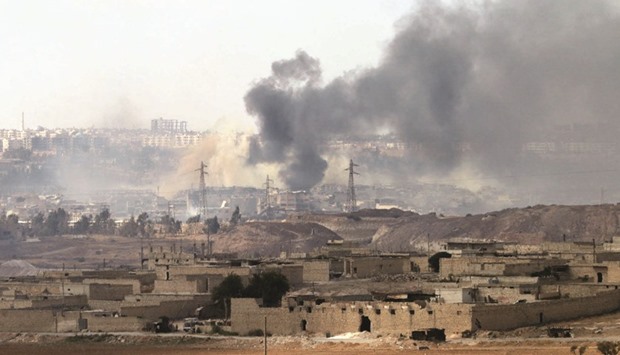Syrian government troops renewed the siege of rebel-held parts of Aleppo yesterday, as Washington and Moscow failed to reach a deal on stemming violence in the country’s devastating war.
Turkish forces and allied Syrian rebels meanwhile expelled the Islamic State group from the last stretch of the Syrian-Turkish border under its control, a monitor said. Syrian state media said the army and allied forces had taken an area south of Aleppo, severing the sole route left into the eastern neighbourhoods held by the opposition.
“The armed forces in co-operation with their allies took full control of the military academy zone south of Aleppo and are clearing the remaining (rebels) from the area,” state television said, citing a military source.
It said the advance “cut all the supply and movement routes for (rebel) groups from southern Aleppo province to the eastern neighbourhoods and Ramussa.”
The development leaves about 250,000 people living in rebel-controlled parts of the city cut off from the outside world once again, and will raise new fears about a humanitarian crisis in Aleppo.
Once Syria’s economic powerhouse, the city has been ravaged by the war that began with anti-government protests in March 2011.
It has been roughly divided between government control in the west and rebel control in the east since mid-2012, but in recent months regime forces slowly began to encircle the east.
In July, they severed the only road into the rebel neighbourhoods, the key Castello Road running from the Turkish border in the north, creating food and fuel shortages in the east.
The siege prompted international concern, with aid agencies urging 48-hour ceasefires to ensure humanitarian access.
In early August, rebel forces including Al Qaeda’s former Syrian affiliate battled regime forces south of the city to open a new route to the east, through Ramussa district.
But in recent days regime forces backed by Syrian and Russian war planes launched a counter-offensive.
A key regime ally, Moscow began an aerial campaign in support of President Bashar al-Assad’s government last September, even as it continued to publicly support efforts for a negotiated solution to the five-year war.
Earlier yesterday, hopes were raised that Moscow and Washington might be on the verge of announcing a deal to halt the bloodshed.
US President Barack Obama said both nations were working “around the clock” on a ceasefire, and a State Department official said a deal was close.
But the hopes evaporated later in the day, with a State Department official saying Russia had “walked back on some of the areas we thought we were agreed on.”
Instead, US Secretary of State John Kerry and his Russian counterpart Sergei Lavrov are set to meet again today in Hangzhou, China, where G20 leaders are gathered.
“We’re going to review some ideas tonight, a couple things on these couple of tough issues, and come back together and see where we are,” said Kerry.
“We’re not going to rush,” he said, stressing the importance of reaching a deal that was able “to try to get the job done”.

Smoke billows yesterday from a location on the southern outskirts of the Syrian city of Aleppo after regime forces retook control of three military academies from rebel fighters.
